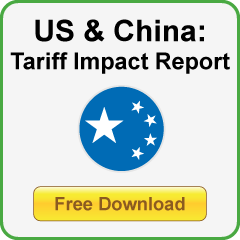Tariff Tracker: Congressional Testimony Reveals Divide Among Flooring Manufacturers
by Sarah Schmidt
September 20, 2018
Will the tariffs imposed by the Trump administration help or hurt the US flooring industry? Testimony by key industry participants at hearings held by the Section 301 Committee of the US Trade Representative shows that companies are divided as to the long-term effects of these tariffs.
Opponents Claim That Tariffs Will Lead to Higher Costs for Importers, Consumers
Firms that rely on imports – particularly those sourced from China – to supply the US flooring market are opposed to the tariffs. Suppliers of such hard surface flooring products as luxury vinyl tile (LVT) and decorative tile flooring rely on foreign-made goods for a number of reasons.
Some companies sell foreign-made flooring because it costs less than US-made goods. These savings can be passed on to consumers, allowing homeowners to add luxury and value to their homes for a modest cost, while also providing high-wage work for flooring installers and other skilled craftspeople.
Other manufacturers note that the US simply doesn’t have the production capacity to make flooring products desired by US consumers, such as ceramic tile and LVT with highly realistic surface textures that resemble more costly hardwood flooring or natural stone. US consumers increasingly demand such high-quality products for their homes and don’t seem to object to installing products made outside of the country.
Leaders of these firms – such as Metroflor/Halstead, MS International, and the Shaw Floors subsidiary of Berkshire Hathaway – testified before the Section 301 Committee that the imposition of tariffs on flooring would have a negative effect on their businesses by making their products more expensive for consumers.
Supporters Claim That Tariffs Will Level Playing Field for US Manufacturers
However, a number of other industry participants voiced their support of US tariff policy. Many firms – especially those with a substantial manufacturing presence in the US – pointed out that the imposition of tariffs would allow them to more fairly compete with companies that source hard surface flooring from overseas. Among the companies that sent pro-tariff representatives to testify were Congoleum and Mohawk Industries.
Several industry participants accused overseas flooring manufacturers of undercutting US firms on price to gain market share and force domestic producers out of the market.
Thus, the imposition of tariffs would go a long way in leveling the playing field for US manufacturers. Indeed, some participants noted that tariffs would not only protect US jobs but allow firms to expand their operations to meet rising domestic demand for LVT, creating manufacturing jobs in communities across the US.
Debate over the effects of these tariffs on the US flooring industry will persist as the US and Chinese governments continue to impose tariffs on imported products.
To Learn More
For more insights on the flooring market in the US and worldwide, check out these studies from the Freedonia Group:
To learn more about dueling tariffs and the industries they'll impact the most, check out one of the latest white papers from the Freedonia Group, "US & China: Tariff Impact Report".
About the Author:
Have unique research needs?
Freedonia Custom Research listens intently to your needs and objectives. Then we work diligently to define and deliver a service to meet them.Subscribe to Our Blog
Stay up to date with the latest information about new market research and news in areas relevant to your business from our analysts and team members.Freedonia Group Blog Subscription
Provide the following details to subscribe.
